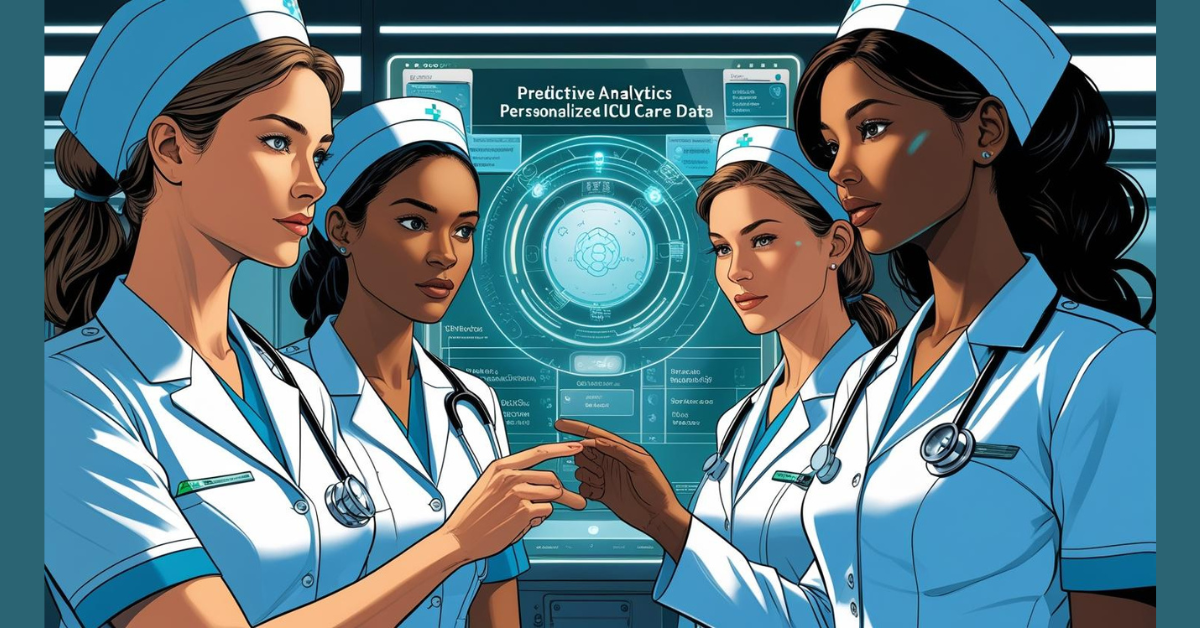The Critical Care Nursing and AI From Predictive Analytics to Personalized ICU Care. AI has significant potential in nursing, facilitating the use of clinical practice data for research and decision-making.
The Critical Care Nursing and AI From Predictive Analytics to Personalized ICU Care
AI in intensive care is rapidly evolving, from predictive analytics to personalized critical care, offering tools that improve clinical decisions, optimize patient outcomes, and increase efficiency. AI-based systems can analyze vast amounts of patient data, predict potential risks, and personalize treatment plans, ultimately resulting in improved patient care and better resource management.
AI has enormous potential to transform intensive care by improving predictive capabilities, personalized care, and increased efficiency. By addressing ethical considerations and fostering collaboration between clinicians and AI developers, we can harness AI’s potential to revolutionize patient care in the ICU and beyond.
The Evolution from Prediction to Personalization
AI in essential care nursing has developed past easy tracking to growing in reality personalized remedy approaches. Both precision remedy and synthetic intelligence (AI) strategies effect the intention of personalizing care in 5 ways: remedy making plans the use of clinical, genomic or social and behavioral determinants of health, and chance prediction/diagnosis, the use of genomic or different variables.
Predictive Analytics as the Foundation
Predictive analytics serves because the cornerstone of customized ICU cares. AI gives large advantages, which includes the real-time information evaluation for the early detection of affected person deterioration, automation of recurring tasks, and augmentation of scientific expertise. These structures constantly examine substantial quantities of affected person information to discover styles and expect consequences earlier than they end up clinically apparent.
The strength of those predictive fashions lies of their cap potential to system a couple of information streams simultaneously, permitting nurses to assume affected person wishes and intrude proactively as opposed to reactively.
Personalized Treatment Through Reinforcement Learning
One of the maximum promising tendencies is the software of reinforcement mastering to create individualized remedy protocols. Reinforcement mastering may want to offer top-rated sequential decision-making answers for sepsis remedy, showcasing the capacity effect of AI to generate personalized answers. This technique permits AI structures to analyze from remedy effects and constantly refine tips for character patients.
AI algorithms have a look at affected individual-unique data, which incorporates scientific history, genetic information, manner of lifestyles factors, and treatment responses of similar patients, to generate custom designed treatment recommendations. This whole approach ensures that each affected individual receives care tailored to their particular developments and circumstances.
Personalized Care Delivery Systems
Modern AI structures are designed to supply fantastically individualized care experiences. All robot structures and gear are engineered to supply greater personalized, convenient, and sensible scientific offerings to sufferer’s with inside the ICU, simultaneously aiming to lessen the enormous workload on ICU scientific body of workers and sell healing and care procedures.
Personalized remedy, additionally called precision medication or personalized medication, is an method that tailors hospital therapy to person sufferers primarily based totally on their particular characteristics, consisting of genetics, environment, lifestyle, and biomarkers. This individualized method ambitions to enhance remedy effectiveness whilst lowering negative effects.
The Role of Nurses in AI-Driven Personalized Care
Critical care nurses are on the middle of this transformation, serving because the bridge among AI insights and affected person care. This observes delves into the human factor, exploring how nurses with management roles understand the effect of AI on their expert practice. Nurses need to interpret AI recommendations, validate them in opposition to scientific judgment, and make certain they align with affected person-precise wishes and preferences.
Challenges in Implementation
Despite the promising potential, imposing customized AI care faces sizeable barriers. Major barriers to large powerful utility of AI processes to the real-time care of the significantly unwell consist of statistics integration challenges, device interoperability issues, and the want for sizeable education and guide for nursing staff.
Future Directions and Opportunities
The destiny of AI in vital care nursing factors closer to more and more more state-of-the-art personalization capabilities. Future ICU layout must include the functionalities of AI answers to permit clinicians to react in advance to any capability deterioration, and researchers to construct fashions that carry out better.
Personalized medication involves tailoring hospital treatment to an individual`s particular genomic and molecular characteristics. AI holds full-size promise in advancing the sphere of personalized medication. This integration of genomic facts with scientific facts represents the subsequent frontier in personalized ICU care.
Impact on Patient Outcomes
The transition from predictive analytics to customized care is already displaying measurable enhancements in affected person outcomes. AI-pushed personalization permits greater specific interventions, reduces useless treatments, and optimizes aid usage even as keeping excessive requirements of care quality.
As AI generation maintains to advance, the focal point stays on growing structures that decorate in preference to update human expertise, making sure that customized care continues the compassionate, holistic method that defines first rate nursing practice. The closing intention is to create ICU environments wherein each affected person gets care that isn’t best clinically most useful however additionally for my part significant and aware of their person wishes and circumstances.
Read More:
https://nurseseducator.com/didactic-and-dialectic-teaching-rationale-for-team-based-learning/
https://nurseseducator.com/high-fidelity-simulation-use-in-nursing-education/
First NCLEX Exam Center In Pakistan From Lahore (Mall of Lahore) to the Global Nursing
Categories of Journals: W, X, Y and Z Category Journal In Nursing Education
AI in Healthcare Content Creation: A Double-Edged Sword and Scary
Social Links:
https://www.facebook.com/nurseseducator/
https://www.instagram.com/nurseseducator/
https://www.pinterest.com/NursesEducator/
https://www.linkedin.com/in/nurseseducator/
https://www.researchgate.net/profile/Afza-Lal-Din
https://scholar.google.com/citations?hl=en&user=F0XY9vQAAAAJ



I have been exxploring foor a bit ffor any hiigh quiality articles or blog poksts on this sokrt of house
. Exploring in Yahoo I eentually stumbled upon this web site.
Studying this information So i’m happy tto exhibit that I’ve a very good uncanny feeling I found out just wat I needed.
I so much definitely will make certain to don?t fail to remember this web site annd
provides it a look regularly. https://Bookofdead34.Wordpress.com/